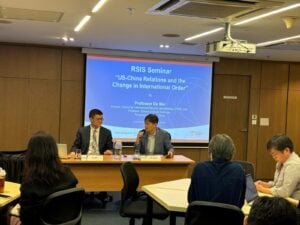Abstract
Trump’s victory in the 2024 US presidential election sends a clear signal: the transitional period that began in 2009 has come to an end, and the post-Cold War international order is now over. China and the United States had periods of cooperation during both the Cold War and the post-Cold War international order. However, with changes in the international order, the US-China relationship is inevitably facing a readjustment. This provides a structural explanation for the deterioration of US-China relations in recent years. In the new international order, it is possible but not inevitable for the US and China to move toward confrontation and conflict. Which country can better adapt to the new order and whether they can identify shared interests within it will determine the future trajectory of US-China relations.
About the Speaker
Da Wei is the Director of the Centre for International Security and Strategy (CISS) at Tsinghua University, and a professor in the Department of International Relations at Tsinghua. His research expertise encompasses China-US relations and US security & foreign policy. Da Wei has been working in China’s academic and policy community for nearly 3 decades. He had worked at China Institutes of Contemporary International Relations (CICIR) for more than 20 years and his last position there was the director of the Institute of American Studies from 2013 to 2017. After that, he served as the Assistant President of University of International Relations (UIR) and the dean of the department of International Politics of UIR from 2017 to 2020. Since January 2021, Dr Da Wei has worked in Tsinghua University. In addition to his current roles, Da Wei serves as a vice president of the Chinese Association of American Studies and is on the boards of various other academic organizations and associations. He earned his BA and MA from the University of International Relations in Beijing and his Ph.D. from CICIR. Da Wei was a senior visiting scholar at the Atlantic Council (2006-2007), Johns Hopkins University (2008-2009), and Stanford University (2024).



 Add to Google calendar
Add to Google calendar
 Add to Outlook calendar
Add to Outlook calendar


